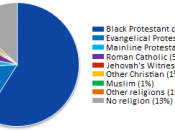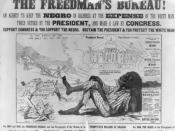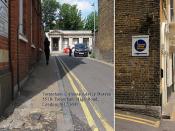Discuss the reality of the reconstructed south with special reference to the situation of the freed slaves in that part of the country
The Southern states were in political and economic ruins after the civil war. Several
difficult decades of reconstructing the south lay ahead. In the short term, the
Federal and state governments needed to plan for the adoption of new state constitutions,
new land policies, and rights of suffrage. The reform of the constitution and land policies
proved much easier to accomplish than those of racial attitudes and justice.
The story of reconstruction is actually a story of the tension between increasing
the rights of freedmen and unchanged racism of Southerners and Northerners alike.
Tension also developed between the so-called radical reconstructionists, who
sought a complete overhaul of Southern society in the image of the North, and the
moderates, who urged reconciliation and the cession of reconstruction responsibilities to
Southern states.
Reconstructionists discovered that efforts to expand suffrage rights to the newly freed
slaves could easily run aground. With the abolition of slavery, the "three-fifths clause" in
the Constitution effectively became null and void, since blacks were now counted as
whole citizens. This change meant that the South might actually gain power in Congress,
since their proportionate representation would be based on a large population. To help
counterbalance this gain, President Johnson proposed extending the vote to literate
blacks worth at least 250 dollars. Southern states rejected the idea, and blacks remained
deprived of their political rights.
Racist opposition to the expanding role of African-Americans in society also took the
form of "black codes." Following emancipation, Southern legislature undertook the
business of determining the status of freedmen in society; as the legislators operated
under certain obligations, not all of the black codes were oppressive. Some laws extended
to freedmen legal protections such as recognized marriages, the right to own and sell
property, and the ability to enter into contractual relationships.
However, in most cases the black codes also prohibited African-Americans from serving
on juries and providing legal testimony. In addition, the codes outlawed interracial
marriage and created segregated public facilities. Harsher aspects of the codes included
vagrancy laws, under which unemployed blacks were often fined and then sent to prison
to work of their fine, as well as licensing requirements for non-agricultural occupations.
In the face of such obstacles and prejudice, the Federal government sought to gain a
tighter grip on Southern reconstruction by creating the Freedmen's Bureau. The
Freedmen's Bureau was a Federal agency charged with helping to manage and ease the
transition from slavery to freedom. As union troops began to occupy the South, the
Bureau set up offices in each of the former Confederate states. Eventually, 550 local
agents, most of them Northerners sympathetic to the plight of former slaves, worked
toward the elusive goal of racial reconstruction.
The Bureau took on overwhelming responsibilities. One of its foremost was to provide
legal guidance for freed persons. This duty included the settling of disputes between
blacks and whites, observation of trials, and the arrangement of contractual labor
relationships between former slaves and owners. As part of this process, through a newly
created category of freedmen's courts that could override local authority, the Bureau
managed to change some of the harsher aspects of the black codes.
Also under the Bureau's purview was the task of trying to reorganize land
ownership, which would prove not to be very effective in the end. For a while at least the
Bureau gave a boost to thousands of freedmen by settling families on abandoned land,
arranging land sales at cheap prices, and providing livestock and equipment. As a last
resort, the agency simply gave food rations to large numbers of poor and unemployed
African-Americans.
Predictably, the Freedmen's Bureau had its detractors, many of whom charged that the
agency instilled a kind of welfare ethic in its benefactors. Since Bureau offices were often
located in cities, they tended to draw African-Americans away from the countryside,
causing an agricultural labor shortage. More importantly, the fact that the offices
provided assistance to the unemployed was seen as encouragement to be "idle."
The structural transformation of American society formed by the civil war dramatically
outpaced the changes in americans' racial attitudes. In many ways, the promised of
emancipation would not be legally realized until the civil rights movement of the 1960s.
To the current day, of course, the tensions of racial coexistence continue to perplex and
frustrate the culture.


